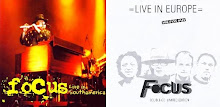Title: Hoeratio
Main Album: Focus X
Track number: 7
Genre: Progressive Rock with vocal
Studio: Fieldwork Studios, Schoten, Belgium
Length: 5:38
Composer: Bobby Jacobs
Musicians: Thijs van Leer – Hammond organ, piano, flute, vocal; Menno Gootjes – Guitars; Bobby Jacobs – Bass; Pierre van der Linden – Drums
Producer: Bobby Jacobs
Label: Eastworld Recordings
Date of recording/release: November, 2012
Alternative version: None
Notes: The band play an atmospheric but languid tune throughout. From 01:12-02:24 van Leer does a voice over reciting from Horace's Ars Poetica the lines below. After this section the guitar leads with a thorough exploration of the fretboard for the next little while before getting back to the march at 04:01 and then van Leer's now more dramatic an unidentified vocal from 04:14. This takes us right to the end where there is a fade.
The words are
Tibia non ut nunc orichalco uincta tubaeque
aemula, sed tenuis simplexque foramine pauco
adspirare et adesse choris erat utilis atque
nondum spissa nimis complere sedilia flatu:
quo sane populus numerabilis, utpote paruus,
et frugi castusque uerecundusque coibat.
Postquam coepit agros extendere uictor et urbem
latior amplecti murus uinoque diuino
placari Genius festis impune diebus,
accessit numerisque modisque licentia maior.
Indoctus quid enim saperet liberque laborum
rusticus urbano confusus, turpis honesto?
The meaning
but slight and simple with few stops – was once of use to lead
and aid the chorus and fill with its breath benches not too
crowded, where, to be sure, folk gathered, easy to count because
few sober folk, too, and chaste and modest.
But when a conquering race began to widen its domain and an
ampler wall embraced its cities and when, on festive days,
appeasing the Genius by daylight drinking brought no penalty,
but then both time and tune won greater licence.
For what taste would you expect of an unlettered throng just freed
from toil rustic mixed up with city folk, vulgar with nobly born?
Note on Horace or Horatio (Hoe ratio is a word play - how rational)
Quintus Horatius Flaccus (65–8 BC), known in the English-speaking world as Horace, was the leading Roman lyric poet during the time of Augustus (Octavian). The rhetorician Quintilian regarded his Odes as just about the only Latin lyrics worth reading: "He can be lofty sometimes, yet he is also full of charm and grace, versatile in his figures, and felicitously daring in his choice of words."
Horace also crafted elegant hexameter verses (Satires and Epistles) and caustic iambic poetry (Epodes). The hexameters are amusing yet serious works, friendly in tone, leading the ancient satirist Persius to comment: "as his friend laughs, Horace slyly puts his finger on his every fault; once let in, he plays about the heartstrings".
His career coincided with Rome's momentous change from a republic to an empire. An officer in the republican army defeated at the Battle of Philippi in 42 BC, he was befriended by Octavian's right-hand man in civil affairs, Maecenas, and became a spokesman for the new regime. For some commentators, his association with the regime was a delicate balance in which he maintained a strong measure of independence (he was "a master of the graceful sidestep") but for others he was, in John Dryden's phrase, "a well-mannered court slave.
The Ars poetica or "The Art of Poetry" is a poem written by him about 19 BC. In it he advises poets on the art of writing poetry and drama. It has "exercised a great influence in later ages on European literature, notably on French drama" and has inspired poets and authors since it was written. Although it had been familiar since the Middle Ages, it was used in literary criticism only since the Renaissance.
It includes several famous phrases including quandoque bonus dormitat Homerus (l. 359) or "sometimes even good Homer nods off". Today this expression is used to indicate that even the most skilled poet can make continuity errors and that long works, usually epics may have their faults without that detracting significantly from their general quality. In context, however, Horace censures Homer for such lapses. I mention it as perhaps Homer nodded here too.























No comments:
Post a Comment